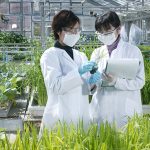Unique research work of a Pakistani scientist on Iodine biofortification of tomato to address issue of deficiency of Iodine in human diet , done at Agriculture University Multan, is being acknowledged and presented practically in German University Christian Albrechts University of Kiel.
Professor Dr Karl H. Muehling, the Institute for Plant Nutrition and Soil Sciences, Christian Albrechts University of Kiel (Germany), witnessed work of Pakistani scientist Nabeel Ikram at Muhammad Nawaz Sharif University of Agriculture (MNSUAM) on tomato, rich in iodine and iron, by applying agronomic techniques and invited him to replicate the research work in Germany.
Also Read: China will build a space centre and more satellites for Pakistan
The scientist Nabeel Ikram talking to APP informed that micronutrients were key components of balanced nutrition. Deficiency of Iron and Iodine cause severe problems to human health. He hinted that iodine deficiency caused goiter, mental retardation, laziness and some other health complications. Similarly, iron deficiency in nutrition also led to different health hazards including anemia, in which blood lacked important red blood cells. The scientist added that red blood cells were very much important because these carried oxygen to different body parts. Similarly, its deficiency in human diet also led to stunted growth, increased loss in pregnancy and newborn mortality, stated Nabeel Ikram.
Globally, the deficiency of Iodine is still a public health issue. About one-third population is suffering from its deficiency. Similarly, one billion population is at risk which could be cured, he informed. Iodine is an essential micro-element for healthy human life. It has important role in human physiology because of its role in production of thyroid hormones.
Also Read: KPK government launches Pakistan’s first digital city, offering tax exemptions for 10 years
According to National Nutritional Survey (NNS 2011), Iron deficiency is very high among women and kids, in Pakistan. The available data showed that 45% women and 67% kids were iron deficient in the country.
The lecturer MNSUAM remarked that Iodine could be provided through salt but the patients with blood pressure could not use it. He, however, added that iodine and iron rich tomato could be best nutrition for human health. Salad or Katchup of tomato is very much common in the country, he noted.
Nabeel recalled that MNSUAM had worked on iodine and iron rich tomatoes. For this purpose, the tomatoes were grown at an area of two and half Kanal in the varsity, under supervision of Vice Chancellor Dr Asif Ali. The tomatoes were made enriched with iron and iodine by applying agronomical methods.
A particular quantity of potassium iodide and iron sulphate was mixed in irrigation water. The roots of the tomato plants consumed this particular water and thus developed iron and iodine rich tomatoes, he maintained.
Also Read: Amazon and Google are Investing in Pakistan for Nationwide Cloud Services
The same research work was being replicating in German University. The University had provided necessary infrastructure for the research work, Nabeel informed.
To a query, he claimed, nutritious tomatoes have high end market. It is highly profit generating crop.
How this enriched tomato is different from other tomatoes, the MNSUAM scientist stated that iron and iodine enriched tomatoes were visually dark-red. Similarly, it has more shelve life. He also added that they achieved an average 12 kilogram tomatoes per plant and termed it remarkable production.
In Pakistan, he suggested food scientists should focus on production of biofortified food crop in order to promote security security, he concluded.
If you are a student explore the latest Scholarships and Internships.
![]()





